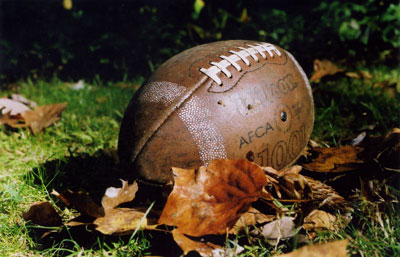All Nonfiction
- Bullying
- Books
- Academic
- Author Interviews
- Celebrity interviews
- College Articles
- College Essays
- Educator of the Year
- Heroes
- Interviews
- Memoir
- Personal Experience
- Sports
- Travel & Culture
All Opinions
- Bullying
- Current Events / Politics
- Discrimination
- Drugs / Alcohol / Smoking
- Entertainment / Celebrities
- Environment
- Love / Relationships
- Movies / Music / TV
- Pop Culture / Trends
- School / College
- Social Issues / Civics
- Spirituality / Religion
- Sports / Hobbies
All Hot Topics
- Bullying
- Community Service
- Environment
- Health
- Letters to the Editor
- Pride & Prejudice
- What Matters
- Back
Summer Guide
- Program Links
- Program Reviews
- Back
College Guide
- College Links
- College Reviews
- College Essays
- College Articles
- Back
Flag Football
In elementary school, I could stray from the circle of gossip among the large group of fifth grade girls and juggle a soccer ball in isolation. I was never lonely like this. I was contempt. As I started to grow up, I learned that straying from the group like this is unacceptable in society. I have heard an abundance of stories about how teenagers have given up their dreams to please the expectations of others. I was only in fifth grade, but my decision against engaging in the popular opinions of others was one that most people refrain from even considering throughout their lifetimes.
From those moments in solitude, I have continued to embrace my admirations for different activities that may seem unusual to others. In eighth grade, I started to play flag football. The sport strays from the norms of society because football is supposedly only for boys. Honestly, I thought that at this point in time people had forgotten about who is supposed participate in specific activities and how people are supposed to act. However, I also developed the expectations that my friends were supposed to accept what I do no matter what it was. I was wrong on both accounts.
Although I was not planning to expose my liking for the sport, I ended up communicating that I had played the weekend before to my friend. She responded with the simple question, “Did you actually?”. When I assured her that yes, I had actually played flag football on Sunday, she refused to believe me. The feeling was absolutely dreadful. She continued to laugh at me as she was in a mental dispute with herself over whether I had actually played flag football. This was a definite crime that would end our friendship because of the judgements of others. She made sure to emphasize her expectations and how I had deceived them.
Despite the feeling of shame creeping through me, I came back to football the next Sunday for the last game of the season. I scored four touchdowns and two extra points, and I planned to boast about it to my “friend” on Monday. Again, she laughed at me. This time, I laughed back. It struck me that in high school, classes that separated us might cause a lack of communication. In college, we may be across the country from each other.
So what did it matter that she looked down upon my happiness in such an “unusual sport”? How am I supposed to navigate my way through college if I have always relied on my middle and high school friends? How am I supposed to accomplish anything if I cannot be my own advocate? It doesn’t matter that my middle school acquaintance found a sense of inferiority in how I spent my weekends. I cannot make it through my college experience if I have ceased to be socially independent throughout my childhood. And clearly, without the ability to be my own advocate, I am not able to accomplish anything in the real world. While most girls fifth grade girls would participate in a gossip circle, I was contemplating the secret to a successful lifestyle.

Similar Articles
JOIN THE DISCUSSION
This article has 0 comments.
